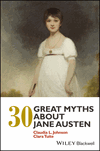JANE AUSTEN'S MUSLINS
Summary
The myth of Jane Austen's muslins is double-edged: one version holds that Austen satirizes fashion (as she must); the other that she is uncritically preoccupied with this trivial feminine pursuit. The underlying assumption of both is that fashion is petty women's business. The assumption that fashion is trivial is overturned in Austen's fiction, most famously by Northanger Abbey's Henry Tilney, who impresses Mrs. Allen with his understanding of muslins. Austen's treatment of muslins as both clothing and commodity tells us about her social position in the precarious class of the landless gentry. Austen's muslins offer a case study of consumer desire. Austen's understanding of the enigmas of conspicuous consumption, in which less is often more, imbues the satirical vision of her neighbor, Mrs. Powlett, a clergyman's wife.



